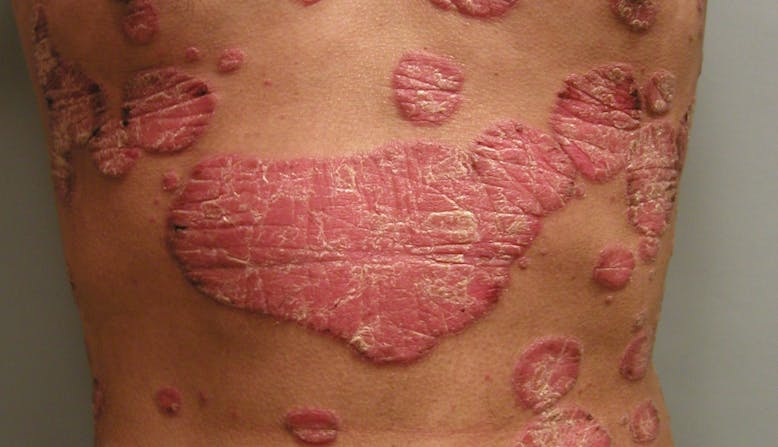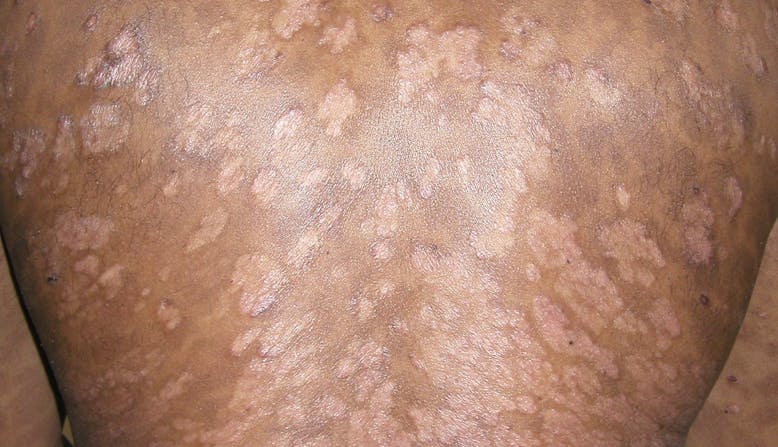Helpline800-723-9166
Donate
Psoriasis affects more than 3% of the US adult population. That is more than 7.5 million US adults.
Armstrong et al., JAMA Derm 2021
Did You Know?
• Life with Psoriasis
What Is Psoriasis?
Psoriasis is an immune-mediated disease (a disease with an unclear cause that is characterized by inflammation caused by dysfunction of the immune system) that causes inflammation in the body. [1] There may be visible signs of inflammation such as raised plaques (plaques may look different for different skin types) and scales on the skin.
This occurs because the overactive immune system speeds up skin cell growth. Normal skin cells completely grow and shed (fall off) in a month. With psoriasis, skin cells do this in only three or four days. Instead of shedding, the skin cells pile up on the surface of the skin. Some people report that psoriasis plaques itch, burn, and sting. Plaques and scales may appear on any part of the body, although they are commonly found on the elbows, knees, and scalp.
Inflammation caused by psoriasis can impact other organs and tissues in the body. People with psoriasis may also experience other health conditions. One in three people with psoriasis may also develop psoriatic arthritis. Signs of PsA include swelling, stiffness, and pain in the joints and areas surrounding the joints. PsA often goes undiagnosed, particularly in its milder forms. However, it’s important to treat PsA early on to help avoid permanent joint damage.
Symptoms often start between ages 15 and 25 but can start at any age. Men, women, and children of all skin colors can get psoriasis.
Psoriasis Types
There are five types of psoriasis.
- Plaque Psoriasis
- Guttate Psoriasis
- Pustular Psoriasis
- Inverse Psoriasis
- Erythrodermic Psoriasis
It is possible to have more than one type of psoriasis at one time and more than one type in a lifetime. Treatments may vary depending on the type and location of the psoriasis.
Plaque Psoriasis
Guttate Psoriasis

Inverse Psoriasis
Psoriasis Locations
Psoriasis locations can be anywhere on the body. Common psoriasis locations:
- Ears
- Eyelids
- Feet
- Hands
- Nails
- Scalp
- Skin folds (including genitals)
Plaques can be a few small patches or can affect large areas. It’s possible to have psoriasis plaques and scales in more than one location on the body at a time. Psoriasis on certain locations, called high-impact sites, can have an increased negative impact on quality of life, regardless of the total area affected by psoriasis.
Causes and Triggers
While scientists do not know what exactly causes psoriasis, we do know that the immune system and genetics play major roles in its development. One thing we do know: psoriasis is not contagious. You cannot catch psoriasis from another person. Usually, something triggers psoriasis, causing symptoms to appear or worsen. Triggers vary from person to person.
Causes and TriggersLife with Psoriasis
As with other chronic diseases, psoriasis may affect areas of your life other than your physical health. Psoriasis may affect your emotional health, your relationships, and how you handle stress. It could even affect areas of your life that you wouldn’t expect, such as the clothes that you choose to wear. For some people, living with psoriasis can be a challenge. However, there are ways to handle those challenges so you can thrive with psoriasis.
Life with Psoriasis.png?ixlib=gatsbyFP&auto=compress%2Cformat&fit=max&rect=12%2C0%2C1175%2C675&w=778&h=447)
Skin of Color Resource Center
People of all different skin types can get psoriasis.
Find resources%20(7).png?ixlib=gatsbyFP&auto=compress%2Cformat&fit=max&rect=0%2C0%2C778%2C447&w=778&h=447)
Seal of Recognition
These products have been created or are intended to be non-irritating and safe for people withpsoriasis.
View the product directoryWhat Can I Do?
Although there is no cure, there are more effective psoriasis treatments today than ever before. Treating psoriasis can help improve symptoms as well as lower the risk of developing psoriasis comorbidities such as psoriatic arthritis, heart disease, obesity, diabetes, and depression.
What can I do?Learn More about Psoriasis
Request your free guide to get you up to speed on psoriasis and psoriatic arthritis.
Request yoursFrequently Asked Questions
What is Psoriasis?
Psoriasis is a chronic disease where skin cells build up quickly, typically causing red or discolored, scaly, and itchy patches on the skin. It is not contagious and can vary in severity.
What Causes Psoriasis?
The cause of psoriasis is not fully understood. It is believed to be caused by genetics, the immune system, and the environment.
Is Psoriasis Contagious?
No. Because psoriasis is non-infectious, one individual cannot transmit it to another via physical touch.
What Are the Triggers of Psoriasis?
Psoriasis triggers can vary from person to person, but common triggers include stress, infections, cold weather, certain medications, and skin injuries.
Is There a Cure for Psoriasis?
Currently, there is no known cure for psoriasis, but various treatments can help manage the symptoms and improve the quality of life for those affected.
References
*According to the Journal of Psoriasis and Psoriatic Arthritis.
Rodrigo Valdes-Rodriguez, M.D., Shawn G. Kwatra, M.D., Gil Yosipovitch, M.D. (2018). Itch in Psoriasis: From Basic Mechanisms to Practical Treatments. Psoriasis Forum,Volume: 18a issue: 3,page(s): 110-117.
Last updated on 1/30/24 by the National Psoriasis Foundation.


.png?ixlib=gatsbyFP&auto=compress%2Cformat&fit=max&rect=12%2C0%2C1175%2C675&w=778&h=447)